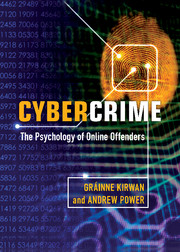Book contents
- Frontmatter
- Contents
- Detailed contents
- List of illustrations
- List of tables
- Preface
- 1 Psychology of cybercrime
- 2 Cybercrimes and cyberlaw
- 3 Hackers
- 4 Malware
- 5 Identity theft and fraud
- 6 Child predation and child pornography online
- 7 Cyberbullying and cyberstalking
- 8 Digital piracy and copyright infringement
- 9 Cyberterrorism
- 10 Crime in virtual worlds
- References
- Index
- References
1 - Psychology of cybercrime
Published online by Cambridge University Press: 05 July 2013
- Frontmatter
- Contents
- Detailed contents
- List of illustrations
- List of tables
- Preface
- 1 Psychology of cybercrime
- 2 Cybercrimes and cyberlaw
- 3 Hackers
- 4 Malware
- 5 Identity theft and fraud
- 6 Child predation and child pornography online
- 7 Cyberbullying and cyberstalking
- 8 Digital piracy and copyright infringement
- 9 Cyberterrorism
- 10 Crime in virtual worlds
- References
- Index
- References
Summary
Case studies
Jack’s computer has been running very slowly for a few days, and eventually he asks his friend to take a look at it for him. His friend downloads the latest version of an antivirus software program, which finds a virus on Jack’s computer. Jack remembers downloading an email attachment received from his sister just before the computer began to slow down. When he searches through his sent messages, he discovers that the file has sent itself on to all of his contacts. Jack feels embarrassed having to tell all his contacts that he was the victim of a virus, and that they should all check their computers. He wonders why anyone would create such a malicious file, and what they have to gain from infecting his computer.
Michael has just been arrested. Police officers have found over 10,000 images and videos of child pornography on his computer, which Michael has downloaded from the internet. Michael claims that he hasn’t really done any harm as he has never abused a child himself, nor has he ever uploaded any images to the internet.
Chapter overview
This chapter is designed to introduce the reader to forensic psychology. It may be that you are studying cybercrime as part of a wider forensic psychology module or course, in which case you may have already come across many of the concepts in this chapter, and you may prefer to move directly on to the rest of the chapters in this book. However, if you have never studied forensic psychology before, this chapter will provide you with some of the fundamental concepts of the field, especially those that relate to the study of the psychology of cybercrime.
- Type
- Chapter
- Information
- CybercrimeThe Psychology of Online Offenders, pp. 1 - 27Publisher: Cambridge University PressPrint publication year: 2013



